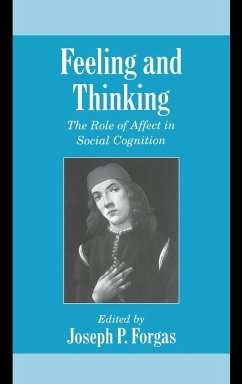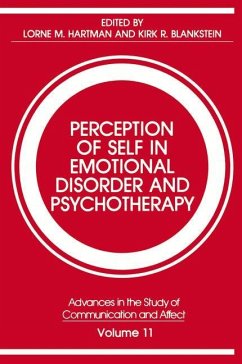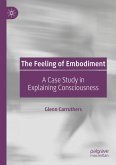Joseph P. ForgasThe Role of Affect in Social Cognition
Feeling and Thinking
The Role of Affect in Social Cognition
Herausgeber: Forgas, Joseph P.; Oatley, Keith
Joseph P. ForgasThe Role of Affect in Social Cognition
Feeling and Thinking
The Role of Affect in Social Cognition
Herausgeber: Forgas, Joseph P.; Oatley, Keith
- Gebundenes Buch
- Merkliste
- Auf die Merkliste
- Bewerten Bewerten
- Teilen
- Produkt teilen
- Produkterinnerung
- Produkterinnerung
Offers new insights on the fundamental links between affect and cognition.
Andere Kunden interessierten sich auch für
![The Navigation of Feeling The Navigation of Feeling]() William M. ReddyThe Navigation of Feeling136,99 €
William M. ReddyThe Navigation of Feeling136,99 €![Perception of Self in Emotional Disorder and Psychotherapy Perception of Self in Emotional Disorder and Psychotherapy]() Perception of Self in Emotional Disorder and Psychotherapy41,99 €
Perception of Self in Emotional Disorder and Psychotherapy41,99 €![Feeling Climate Change Feeling Climate Change]() Debra J DavidsonFeeling Climate Change176,99 €
Debra J DavidsonFeeling Climate Change176,99 €![The Wisdom in Feeling The Wisdom in Feeling]() Peter Salovey (ed.)The Wisdom in Feeling80,99 €
Peter Salovey (ed.)The Wisdom in Feeling80,99 €![Emotions and Beliefs Emotions and Beliefs]() Emotions and Beliefs104,99 €
Emotions and Beliefs104,99 €![Speaking from the Heart Speaking from the Heart]() Stephanie A. ShieldsSpeaking from the Heart64,99 €
Stephanie A. ShieldsSpeaking from the Heart64,99 €![The Feeling of Embodiment The Feeling of Embodiment]() Glenn CarruthersThe Feeling of Embodiment44,99 €
Glenn CarruthersThe Feeling of Embodiment44,99 €-
-
-
Offers new insights on the fundamental links between affect and cognition.
Hinweis: Dieser Artikel kann nur an eine deutsche Lieferadresse ausgeliefert werden.
Hinweis: Dieser Artikel kann nur an eine deutsche Lieferadresse ausgeliefert werden.
Produktdetails
- Produktdetails
- Verlag: Cambridge University Press
- Seitenzahl: 440
- Erscheinungstermin: 5. Januar 2004
- Englisch
- Abmessung: 235mm x 157mm x 30mm
- Gewicht: 861g
- ISBN-13: 9780521642231
- ISBN-10: 052164223X
- Artikelnr.: 21164020
- Herstellerkennzeichnung
- Libri GmbH
- Europaallee 1
- 36244 Bad Hersfeld
- gpsr@libri.de
- Verlag: Cambridge University Press
- Seitenzahl: 440
- Erscheinungstermin: 5. Januar 2004
- Englisch
- Abmessung: 235mm x 157mm x 30mm
- Gewicht: 861g
- ISBN-13: 9780521642231
- ISBN-10: 052164223X
- Artikelnr.: 21164020
- Herstellerkennzeichnung
- Libri GmbH
- Europaallee 1
- 36244 Bad Hersfeld
- gpsr@libri.de
1. Introduction: the role of affect in social cognition Joseph P. Forgas;
Part I. Fundamental Issues: The Interplay of Affect and Cognition: 2.
Nonconscious and noncognitive affect Robert Zajonc; 3. Challenge and
threat: the interplay of affect and cognition Jim Blascovich and Wendy
Berry Mendes; 4. Affect and appraisal Craig A. Smith and Leslie D. Kirby;
Part II. The Informational Role of Affect: 5. Cognitive and clinical
perspectives on mood dependent memory Eric Eich and Dawn Macauley; 6. Some
conditions affecting overcorrection of the judgment-distorting influence of
one's feelings Leonard Berkowitz, Sara Jaffee, Eunkyung Jo and Bartholomeu
T. Troccoli; 7. Mood as input: a configural view of mood effects Leonard L.
Martin; 8. Affective forecasting and durability bias: the problem of the
invisible shield Dan Gilbert; Part III. Affect and Information Processing:
9. Mood and general knowledge structures: happy moods and their impact on
information processing Herbert Bless; 10. A connectionist approach to
understanding the impact of mood on cognitive functions of assimilation and
accommodation; 11. The role of different processing strategies in mediating
mood effects on cognition Joseph P. Forgas; Part IV. Affect and Social
Knowledge Structures: 12. Self-organization in emotional contexts Carolin
Showers; 13. Prologues to a unified theory of affect, attitudes,
stereotypes, and self-concept Anthony Greenwald; 14. Interpersonal
emotions, social cognition, and self-relevant thought Mark Leary; 15.
Emotional response categorization Paula Niedenthal; 16. Integration and
conclusions Joseph P. Forgas.
Part I. Fundamental Issues: The Interplay of Affect and Cognition: 2.
Nonconscious and noncognitive affect Robert Zajonc; 3. Challenge and
threat: the interplay of affect and cognition Jim Blascovich and Wendy
Berry Mendes; 4. Affect and appraisal Craig A. Smith and Leslie D. Kirby;
Part II. The Informational Role of Affect: 5. Cognitive and clinical
perspectives on mood dependent memory Eric Eich and Dawn Macauley; 6. Some
conditions affecting overcorrection of the judgment-distorting influence of
one's feelings Leonard Berkowitz, Sara Jaffee, Eunkyung Jo and Bartholomeu
T. Troccoli; 7. Mood as input: a configural view of mood effects Leonard L.
Martin; 8. Affective forecasting and durability bias: the problem of the
invisible shield Dan Gilbert; Part III. Affect and Information Processing:
9. Mood and general knowledge structures: happy moods and their impact on
information processing Herbert Bless; 10. A connectionist approach to
understanding the impact of mood on cognitive functions of assimilation and
accommodation; 11. The role of different processing strategies in mediating
mood effects on cognition Joseph P. Forgas; Part IV. Affect and Social
Knowledge Structures: 12. Self-organization in emotional contexts Carolin
Showers; 13. Prologues to a unified theory of affect, attitudes,
stereotypes, and self-concept Anthony Greenwald; 14. Interpersonal
emotions, social cognition, and self-relevant thought Mark Leary; 15.
Emotional response categorization Paula Niedenthal; 16. Integration and
conclusions Joseph P. Forgas.
1. Introduction: the role of affect in social cognition Joseph P. Forgas;
Part I. Fundamental Issues: The Interplay of Affect and Cognition: 2.
Nonconscious and noncognitive affect Robert Zajonc; 3. Challenge and
threat: the interplay of affect and cognition Jim Blascovich and Wendy
Berry Mendes; 4. Affect and appraisal Craig A. Smith and Leslie D. Kirby;
Part II. The Informational Role of Affect: 5. Cognitive and clinical
perspectives on mood dependent memory Eric Eich and Dawn Macauley; 6. Some
conditions affecting overcorrection of the judgment-distorting influence of
one's feelings Leonard Berkowitz, Sara Jaffee, Eunkyung Jo and Bartholomeu
T. Troccoli; 7. Mood as input: a configural view of mood effects Leonard L.
Martin; 8. Affective forecasting and durability bias: the problem of the
invisible shield Dan Gilbert; Part III. Affect and Information Processing:
9. Mood and general knowledge structures: happy moods and their impact on
information processing Herbert Bless; 10. A connectionist approach to
understanding the impact of mood on cognitive functions of assimilation and
accommodation; 11. The role of different processing strategies in mediating
mood effects on cognition Joseph P. Forgas; Part IV. Affect and Social
Knowledge Structures: 12. Self-organization in emotional contexts Carolin
Showers; 13. Prologues to a unified theory of affect, attitudes,
stereotypes, and self-concept Anthony Greenwald; 14. Interpersonal
emotions, social cognition, and self-relevant thought Mark Leary; 15.
Emotional response categorization Paula Niedenthal; 16. Integration and
conclusions Joseph P. Forgas.
Part I. Fundamental Issues: The Interplay of Affect and Cognition: 2.
Nonconscious and noncognitive affect Robert Zajonc; 3. Challenge and
threat: the interplay of affect and cognition Jim Blascovich and Wendy
Berry Mendes; 4. Affect and appraisal Craig A. Smith and Leslie D. Kirby;
Part II. The Informational Role of Affect: 5. Cognitive and clinical
perspectives on mood dependent memory Eric Eich and Dawn Macauley; 6. Some
conditions affecting overcorrection of the judgment-distorting influence of
one's feelings Leonard Berkowitz, Sara Jaffee, Eunkyung Jo and Bartholomeu
T. Troccoli; 7. Mood as input: a configural view of mood effects Leonard L.
Martin; 8. Affective forecasting and durability bias: the problem of the
invisible shield Dan Gilbert; Part III. Affect and Information Processing:
9. Mood and general knowledge structures: happy moods and their impact on
information processing Herbert Bless; 10. A connectionist approach to
understanding the impact of mood on cognitive functions of assimilation and
accommodation; 11. The role of different processing strategies in mediating
mood effects on cognition Joseph P. Forgas; Part IV. Affect and Social
Knowledge Structures: 12. Self-organization in emotional contexts Carolin
Showers; 13. Prologues to a unified theory of affect, attitudes,
stereotypes, and self-concept Anthony Greenwald; 14. Interpersonal
emotions, social cognition, and self-relevant thought Mark Leary; 15.
Emotional response categorization Paula Niedenthal; 16. Integration and
conclusions Joseph P. Forgas.








